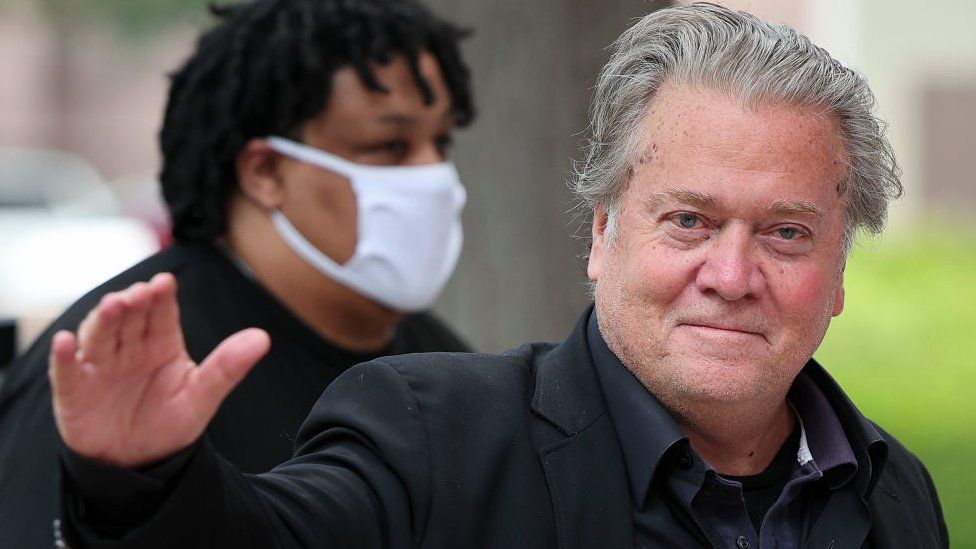ARTICLE AD BOX
 Image source, Getty Images
Image source, Getty Images
Steve Bannon arriving in court on 19 July.
Former Trump strategist Steve Bannon felt "above the law" by defying a legal summons to testify about last year's riot at the US Capitol, prosecutors said at the start of his trial.
Mr Bannon, a key player in Donald Trump's 2016 election win, faces two counts of contempt of Congress.
He is accused of ignoring the "mandatory" summons to testify to a congressional panel investigating the riot.
Mr Bannon, 68, says he is innocent.
If convicted, he could face up to two years in prison.
Mr Bannon served as campaign chief to Mr Trump in 2016 and became the Trump White House's chief strategist until his bitter departure seven months later in the aftermath of a violent far-right 2017 rally in Charlottesville, Virginia. But he has remained in touch with Mr Trump and his top allies.
Following the 6 January 2021 riot, the former Trump adviser did not comply with a legal summonses, known as a subpoena, to testify - as well as submit relevant documents - about his efforts to challenge the outcome of the November 2020 presidential election and organise the protests that culminated in the storming of Congress.
During opening arguments at his trial, federal prosecutor Amanda Vaughn said the subpoena was not "a request" or "an invitation".
"It was mandatory," she said. "The defendant decided he was above the law."
A member of Mr Bannon's defence team, Evan Corcoran, told the jury his client was "innocent of the charges".
In his own opening statement, Mr Corcoran said negotiations over subpoenas are a "process" and that Mr Bannon - whom he described as a "political thinker" - had done nothing wrong.
Prosecutors in the case believe that Mr Bannon may be able to shed light on the events that led to the 6 January riot.
The committee has been particularly interested in Mr Bannon's communications with Mr Trump ahead of the incident, as well as the "war room" meetings held at a nearby hotel with other key figures, allegedly, as part of a last-ditch attempt to thwart certification of President Joe Biden's win.
After first being subpoenaed in September, Mr Bannon vowed to go "medieval" and become a "misdemeanour from hell" for the Biden administration.
He also argued that his contacts with Mr Trump were covered by executive privilege, a legal principle that holds communications between presidents and their advisers to be protected from disclosure in order to allow for candid advice.
The judge, however, had previously ruled that Mr Bannon could not claim he didn't comply with the subpoena as a result of executive privilege.
In the hallway of the courthouse, Mr Bannon did not respond to a journalist's greeting or to questions that were posed to him.
His quiet demeanour was in sharp contrast to the loquacious manner he displayed in the White House when he worked there and, before that, when he worked in the media.
Back then he talked to journalists all the time. The criminal case against him hinges on this point: whether or not he was forthcoming when questions were posed to him - in this case, by members of the congressional committee.
Mr Bannon was supposed to provide information to the committee, but he refused to divulge it, according to the prosecutor.

 2 years ago
54
2 years ago
54








 English (US) ·
English (US) ·